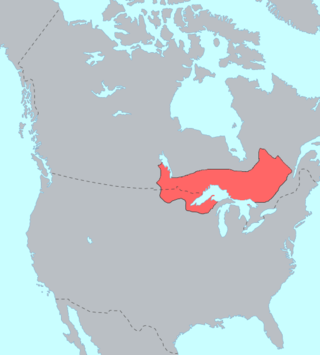
The Ojibwe, Ojibwa, Chippewa, or Saulteaux are an Anishinaabe people in what is currently southern Canada, the northern Midwestern United States, and Northern Plains. They are Indigenous peoples of the Subarctic and Northeastern Woodlands.

The Potawatomi, also spelled Pottawatomi and Pottawatomie, are a Native American people of the Great Plains, upper Mississippi River, and western Great Lakes region. They traditionally speak the Potawatomi language, a member of the Algonquin family. The Potawatomi call themselves Neshnabé, a cognate of the word Anishinaabe. The Potawatomi are part of a long-term alliance, called the Council of Three Fires, with the Ojibway and Odawa (Ottawa). In the Council of Three Fires, the Potawatomi are considered the "youngest brother" and are referred to in this context as Bodéwadmi, a name that means "keepers of the fire" and refers to the council fire of three peoples.
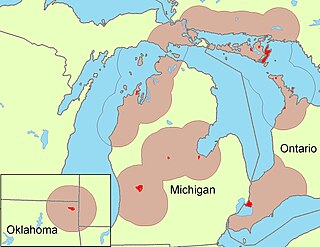
The Odawa, believed to derive from an Anishinaabe word meaning "traders", are an Indigenous American ethnic group who primarily inhabit land in the Eastern Woodlands region, commonly known as the northeastern United States and southeastern Canada. They have long had territory that crosses the current border between the two countries, and they are federally recognized as Native American tribes in the United States and have numerous recognized First Nations bands in Canada. They are one of the Anishinaabeg, related to but distinct from the Ojibwe and Potawatomi peoples.
The Council of Three Fires is a long-standing Anishinaabe alliance of the Ojibwe, Odawa, and Potawatomi North American Native tribes.
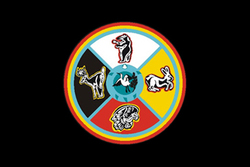
The Sault Ste. Marie Tribe of Chippewa Indians, commonly shortened to Sault Tribe of Chippewa Indians or the more colloquial Soo Tribe, is a federally recognized Native American tribe in what is now known as Michigan's Upper Peninsula. The tribal headquarters is located within Sault Ste. Marie, the major city in the region, which is located on the St. Marys River.
Sandy Lake Band of Mississippi Chippewa are a historical Ojibwa tribe located in the upper Mississippi River basin, on and around Big Sandy Lake in what today is in Aitkin County, Minnesota. Though politically folded into the Mille Lacs Band of Ojibwe, thus no longer independently federally recognized, for decades, Sandy Lake Band members have been leading efforts to restore their independent Federal recognition.

The Grand Traverse Band of Ottawa and Chippewa Indians is a federally recognized Native American tribe located in northwest Michigan on the Leelanau Peninsula. Sam McClellan is the current tribal chairman, elected in June 2016 to a four-year term after succeeding Al Pedwaydon, who served from 2012 to 2016.

Chief Buffalo was a major Ojibwa leader, born at La Pointe in Lake Superior's Apostle Islands, in what is now northern Wisconsin, USA.

The Sandy Lake Tragedy was the culmination in 1850 of a series of events centered in Big Sandy Lake, Minnesota that resulted in the deaths of several hundred Lake Superior Chippewa. Officials of the Zachary Taylor Administration and Minnesota Territory sought to relocate several bands of the tribe to areas west of the Mississippi River. By changing the location for fall annuity payments, the officials intended the Chippewa to stay at the new site for the winter, hoping to lower their resistance to relocation. Due to delayed and inadequate payments of annuities and lack of promised supplies, about 400 Ojibwe, mostly men and 12% of the tribe, died of disease, starvation and cold. The outrage increased Ojibwe resistance to removal. The bands effectively gained widespread public support to achieve permanent reservations in their traditional territories.
The Lake Superior Chippewa are a large number of Ojibwe (Anishinaabe) bands living around Lake Superior; this territory is considered part of northern Michigan, Wisconsin, and Minnesota in the United States. They migrated into the area by the seventeenth century, encroaching on the Eastern Dakota people who had historically occupied the area. The Ojibwe defeated the Eastern Dakota, who migrated west into the Great Plains after the final battle in 1745. While they share a common culture including the Anishinaabe language, this highly decentralized group of Ojibwe includes at least twelve independent bands in the region.

Lac Vieux Desert Band of Lake Superior Chippewa is a band of the Lake Superior Chippewa, many of whom reside on the Lac Vieux Desert Indian Reservation, located near Watersmeet, Michigan. It is approximately 45 miles southeast of Ironwood, Michigan in Gogebic County.
Lake Lena is an unincorporated community and Native American village in Ogema Township, Pine County, Minnesota, United States, located along the Lower Tamarack River. It currently is the administrative center for the Mille Lacs Indian Reservation, District III.

The Little Traverse Bay Bands of Odawa Indians is a federally recognized Native American tribe of Odawa. A large percentage of the more than 4000 tribal members continue to reside within the tribe's traditional homelands on the northwestern shores of the state of Michigan's Lower Peninsula. The historically delineated reservation area, located at 45°21′12″N84°58′41″W, encompasses approximately 336 square miles (870 km2) of land in Charlevoix and Emmet counties. The largest communities within the reservation boundaries are Harbor Springs, where the tribal offices are located; Petoskey, where the Tribe operates the Odawa Casino Resort; and Charlevoix.

Little River Band of Ottawa Indians is a federally recognized Native American tribe of the Odawa people in the United States. It is based in Manistee and Mason counties in northwest Michigan. It was recognized on September 21, 1994.
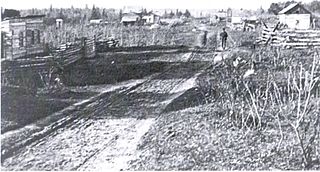
The Burt Lake Burn-Out was a forced relocation of the Burt Lake Band of Chippewa and Ottawa Indians in northern Michigan's "Tip of the Mitt" region on 15 October 1900. On that day a sheriff and his deputies burned down the band's village at the behest of a local land developer who claimed to have purchased the village land parcels for back taxes.

The Mackinac Bands of Chippewa and Ottawa Indians is a state recognized tribe of Ojibwe and Odawa Native Americans, based in the state Michigan. The tribe is headquartered in St. Ignace, Mackinac County and has around 4,000 enrolled members. Today most tribal members live in Mackinac, Chippewa, Emmet, Cheboygan, and Presque Isle counties, however many tribal members are also located throughout the state of Michigan and the United States.
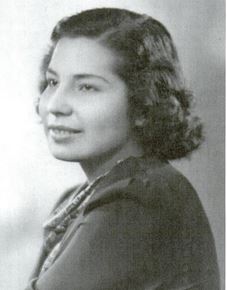
Waunetta McClellan Dominic was an Odawa rights activist who spent her career advocating for the United States government to adhere to its treaty obligations to Native Americans. She was one of the founders of the Northern Michigan Ottawa Association and her influence was widely recognized, especially after winning a 1971 claim against the government for compensation under 19th-century treaties. She was also a proponent of Native American fishing rights being protected. In 1979, she was named by The Detroit News as "Michiganian of the Year" and in 1996, she was posthumously inducted into the Michigan Women's Hall of Fame.
The Treaty of Detroit of 1855 was a treaty between the United States Government and the Ottawa and Chippewa Nations of Indians of Michigan. The treaty contained provisions to allot individual tracts of land to Native people consisting of 40-acre (16 ha) plots for single individuals and 80-acre (32 ha) plots for families, outlined specific tracts which were assigned to the various bands and provided for the severance of the government consolidation of the Ottawa and Chippewa.
Wabiwindego (d.1837), also spelled Wobwindego, Wobiwidigo, or Wabaningo, and known among the Ojibwe as Waabishkindip, was a leader of the Grand River Band of Ottawa in what would become the U.S. State of Michigan. He negotiated the 1836 Treaty of Washington with the federal government on behalf of the Grand River Ottawa, leading to the admission of the State of Michigan to the Union. Several villages he led formed the basis for several modern Michigan towns, including Lowell, Whitehall, and Montague.
















